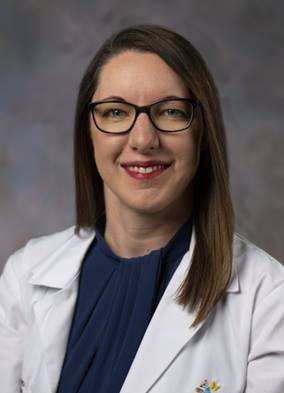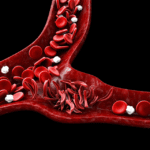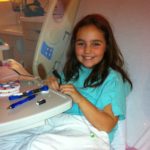Featured Researcher — Jennifer Muszynski, MD, MPH, FCCM
Featured Researcher — Jennifer Muszynski, MD, MPH, FCCM https://pediatricsnationwide.org/wp-content/themes/corpus/images/empty/thumbnail.jpg 150 150 Natalie Wilson Natalie Wilson https://pediatricsnationwide.org/wp-content/uploads/2021/06/Natalieheadshot3-2.png- September 02, 2021
- Natalie Wilson
Jennifer Muszynski, MD, MPH, FCCM, a physician in the Division of Critical Care Medicine at Nationwide Children’s Hospital and an associate director of its fellowship program, is a principal investigator in the Center for Clinical and Translational Research in the Abigail Wexner Research Institute at Nationwide Children’s.
Dr. Muszynski’s research focuses on understanding how receiving donated blood product through transfusion may affect the immune system function of children who are critically ill or require care in Intensive Care Units (ICU).

Her ongoing clinical and translational studies explore complex relationships between the function of children’s immune cells, inflammation, blood product transfusion and clinical outcomes in children with sepsis, trauma, acute lung injury and multiple organ dysfunction.
Dr. Muszynski chairs the Pediatric Critical Care Blood Research Network (BloodNet), a subgroup of the Pediatric Acute Lung Injury and Sepsis Investigators (PALISI) research network. Consisting of over 160 members from 10 countries, BloodNet focuses on improving outcomes in critically ill children through research on hemostasis (stopping bleeding to promote healing), blood management (caring for patients who might need transfusions of blood or blood components) and other aspects of transfusion medicine. Dr. Muszynski is also an associate professor of Pediatrics at The Ohio State University College of Medicine.
Read on to learn more about Dr. Muszynski and her research journey.
How did you decide to pursue a career in your field?
I’ve loved biology and science for as long as I can remember — my favorite book in elementary school was a children’s encyclopedia of biology and my favorite toy was a circuit board! My dad also had a subscription to Discover magazine and some of my fondest memories of childhood are of reading articles and sharing a love of science with him. While I started college as an engineering major, I soon discovered that medicine united my passions for both science and service.
During medical school, I explored many different subspecialty options, but pediatrics felt like home. If I wasn’t working in research, I’d want to be a kindergarten teacher. My favorite jobs before medical school were as a camp counselor for a summer day camp for kindergartners and a gymnastics instructor for kids 3 to 6 years old. I love the imagination and natural curiosity of kids at that age.
What was your path to your current role?
As a pediatric resident, I was struck by the wide range of illness severity that infectious diseases could cause in children. I wanted to know why one child might get pneumonia and be able to be treated at home while another required ICU-level care. As a pediatric critical care medicine fellow, I became especially interested in understanding and treating pediatric septic shock, which is one of the most severe displays of infection.
I started overseeing an observational study of how the immune system functions to clear infection and promote healing in critically ill septic children and the immune effects of blood product transfusions. Blood product transfusions are commonly given to children with septic shock. Based on existing research, we knew that various blood products can alter immune cell function in vitro, but understanding the immune effects of blood products in critically ill patients is much more complicated.
Ultimately, we want to know at the bedside whether a given child with septic shock should receive a transfusion. Previous studies that considered this question around red blood cell transfusion, for instance, used patients’ hemoglobin concentrations to trigger transfusion and excluded patients with shock. My lab and others have found that for patients with septic shock, hemoglobin concentration alone is not the best way to decide when to transfuse.
We don’t know yet, however, how best to predict which children will benefit from transfusion versus those who might be harmed. Our ongoing work aims to use innovative statistical modeling techniques to develop personalized transfusion decision-making so that the right patients are transfused, and we can improve outcomes for children with septic shock.
Fun Facts About Dr. Muszynski
What’s your favorite word, and why?
Possibility. For me, research is about pushing the boundaries of what is known and what is possible. It’s about finding new ways to answer questions we didn’t think were answerable. It’s about reaching for the possibilities of a better tomorrow.
What do you usually eat for breakfast?
Coffee.
Favorite band/genre/artist?
I like many genres of music but mostly listen to folk rock and alternative rock. If I had to choose a favorite band, it would be a toss up between Pearl Jam and Collective Soul.
Favorite way to relax?
I recently started doing yoga on a regular basis, which is an amazing way to relax. I also love being outdoors and family dance parties with my kids.
Why did you decide to pursue your work at Nationwide Children’s?
I did my residency and fellowship training at Nationwide Children’s and then stayed as faculty because of the people and the culture of community and collaboration. I love working at an institution that continually strives to be better to promote the health and wellbeing of all children and their families.
What is your favorite part of your job?
One of the things I like best is that every day brings a new set of challenges. Whether I am working in the ICU, directing my lab or collaborating with colleagues, I never know exactly what to expect each day. I love learning new things and teaching/mentoring others.
What do you hope to accomplish next?
My research program is increasingly collaborative. We are working on extending our single-center studies to multi-center studies. I also look forward to helping grow and support others’ research efforts through collaboration and mentorship within the international Pediatric Critical Care Blood Research Network (BloodNet), which I currently chair.
About the author
Natalie is a passionate and enthusiastic writer working to highlight the groundbreaking research of the incredible faculty and staff across Nationwide Children's Hospital and the Abigail Wexner Research Institute. Her work at Nationwide Children's marries her past interests and experiences with her passion for helping children thrive and a long-held scientific curiosity that dates back to competing in the Jefferson Lab Science Bowl in middle school. Natalie holds a bachelor’s degree in sociology from Wake Forest University, as well as minors in women's, gender & sexuality studies and interdisciplinary writing. As an undergraduate student, Natalie studied writing and journalism, engaged with anthropological and sociological research with a focus on race and ethnic relations, served as executive editor for the student newspaper, the Old Gold & Black, and gained marketing experience as an intern for a nonprofit entrepreneurial incubator, Winston Starts, as well as by working for Wake Forest University School of Law Office of Communication and Public Relations and its Innocence and Justice Clinic.
-
Natalie Wilsonhttps://pediatricsnationwide.org/author/natalie-wilson/
-
Natalie Wilsonhttps://pediatricsnationwide.org/author/natalie-wilson/
-
Natalie Wilsonhttps://pediatricsnationwide.org/author/natalie-wilson/
-
Natalie Wilsonhttps://pediatricsnationwide.org/author/natalie-wilson/
- Posted In:
- Featured Researchers







